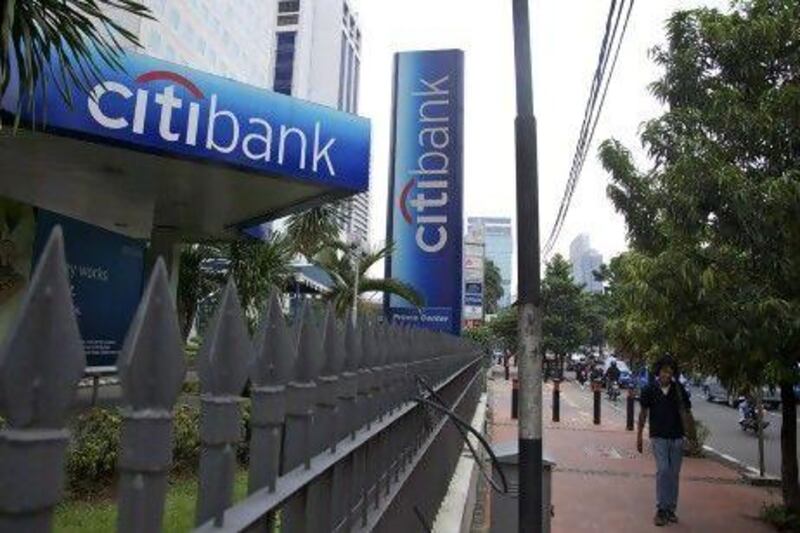Sovereign wealth funds have poured billions of dollars into ailing western banks in the past three years, but the chequered record of those investments leaves doubt about their willingness to support a new wave of bank re-privatisations. Asa Fitch and Gregor Stuart Hunter report
At the height of the credit crunch in 2007, rising defaults on sub-prime mortgages forced big western banks to raise capital from large investors who were not looking for a quick profit.
Back then, banks were still wary of government assistance, so they found help from what were the world's only large-scale investors who fitted the bill: sovereign wealth funds. For the funds, the investments presented golden opportunities to get a slice of the lucrative global banking pie.
In one of the earliest such deals, DIFC Investments, a vehicle owned by the Dubai Government, bought a 2.2 per cent stake in Deutsche Bank in May 2007 with 90 per cent leverage and deploying only about €180 million (Dh948.5m) in cash. The Abu Dhabi Investment Authority (Adia) came through in November that year with a US$7.5 billion (Dh27.54bn) injection into Citigroup, then the US's largest bank.
Money from sovereign funds went to HSBC and Barclays, among others. But four years later, the future for sovereign fund involvement in western banks could hardly be less clear as bank executives come knocking again in the Gulf, home to some of the world's largest state-owned investment funds.
The Deutsche Bank and Citigroup investments both failed to reap bumper dividends.
Adia is understood to be in the midst of an arbitration case with Citigroup in New York, where it is seeking to recover some of its losses on the basis that the investment and its risks were misrepresented. The recent revelation that Goldman Sachs lost more than $1bn entrusted to it by the Libyan Investment Authority has not helped the already damaged reputation of western financial institutions in the Arab world.
"The big losses happened in the American banks, and they will feel that that's much more difficult to invest in," says Victoria Barbary, a senior analyst at The Monitor Group in London.
British banks may have an easier time attracting further funding from the Gulf's investment powerhouses.
In contrast to their courtships with US banks, sovereign investments with British institutions have largely been successful. Abu Dhabi's International Petroleum Investment Company sold its investments in Barclays in 2008, for example, for a profit of about £2.25bn (Dh13.41bn).
Those kinds of successes may pave the way for further deals with UK banks as they start a process of re-privatisation, analysts say. But however they choose to act, Rachel Ziemba of Roubini Global Economics says the crisis has taught funds the value of treading carefully.
"I think sovereign funds, including those from the Gulf, are looking with a bit more scrutiny on all their investments, including investments in foreign banks," she says. "They could invest more in western banks, but they're going to be wary and look more carefully at them."
Neil Smith, a financial analyst at WestLB, says sovereign wealth funds may find investment in nationalised banks more attractive because they tend to have a longer time horizon than most investors.
"One of the standard tactics for getting a difficult placement or capital increase through is to line up some cornerstone investor," he says. "That tends to act as a little bit of evidence that there must be at least a sensible story, and it sometimes encourages other investors with shorter-term horizons."
One of the prime targets for future sovereign fund investment could be the Royal Bank of Scotland (RBS).
Stephen Hester, the RBS chief executive, recently said that investment from a Gulf sovereign wealth fund would be "terrific" from the bank's point of view as he kicked off a tour of the Gulf last month. The bank, he said, was ready to be privatised.
But Shailesh Raikundlia, the European banking analyst at MF Global, says the long-term strength of the bank would depend to a great extent on the ability of the UK economy to recover.
"At the moment, RBS is still benefiting from the government's asset protection scheme, which is helping capital ratios significantly," he says, in reference to the UK's efforts to pump money into the banking sector. "Without that, they would be stretched as far as capital ratios."
The bank is 83 per cent owned by the UK government, alongside a 41 per cent stake in Lloyds Banking Group, both the result of a bailout following the global financial crisis.
Lloyds has to sell 600 branches by the end of the year under EU regulations, before any sale of equity by the government.
Antonio Horta-Osorio, the bank's new chief executive, plans to announce the group's new strategy at the end of this month.
While it seems clear that some new sovereign fund investments will come out of the most recent round of re-capitalisations, Ted Truman, an expert on sovereign funds at the Peterson Institute in the US, says we will probably see fewer of the hastily arranged, headline-grabbing deals that cropped up in 2007 and 2008.
"On the one hand, it makes sense for sovereign wealth funds to invest in financial institutions," he says. "They are supplying capital which the institutions can leverage for them to generate returns … On the other hand, due diligence is always required, and some sovereign wealth funds did not do their due diligence in the past."
ghunter@thenational.ae





